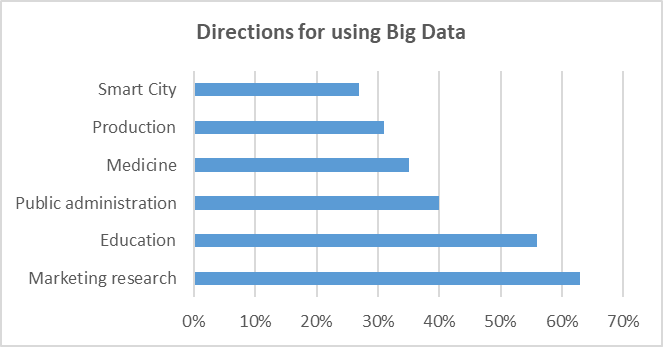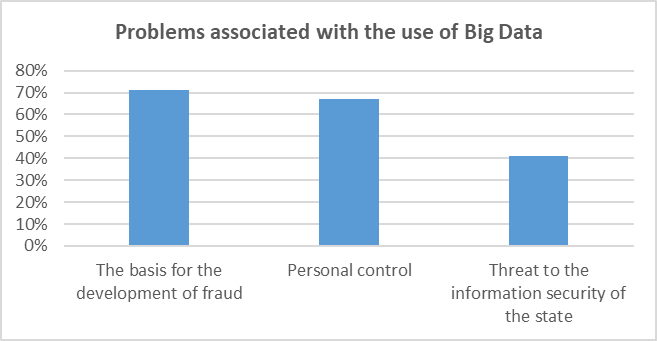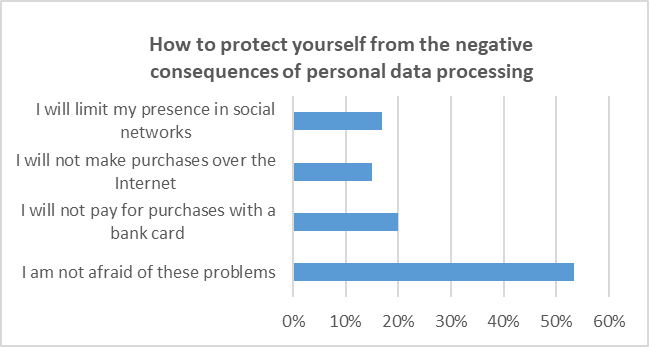Abstract
The legal regulation of big data is a complex task. Promoting innovative development not only meets the interests of the individual, society and the state, but also creates new problems related to measures to protect personal information and privacy risks. The development of the concept of legal regulation of databases is complicated by the lack of a common terminology, different interpretations of the basic concepts. This study focuses on revealing trends in the development of the big-data-oriented digital economy. The authors have also examined the problems that slow this development down. The method of comparative analysis has been used to examine the main digital economy development drivers related to big data. The analysis of the categorical concepts of “digital economy” and “big data” has been carried out through the comparative legal method, empirical and theoretical methods as well as the method of sociological research. Specialists who develop the digital environment play an important role in reinforcing the digitalization of the economy. Therefore, investments in the training of competent specialists are of great importance. The second task is to develop technologies for digital transformation. The third task is to increase the availability of big data analysis tools for small and medium-sized businesses. The fourth task is to formulate some adequate norms for the legal regulation of big data. Sociological studies have shown a big interest of the public to the problems of analytics and big data legal regulation, compliance with information security requirements in this area.
Keywords: Big data, big data categorical concepts, digitalization, digital economy
Introduction
The development of digital technologies and the increase in processing powers made it possible to solve time-consuming multiparametric tasks for the analysis of large data sets collected from different sources in certain subject areas in order to identify trends in the development of data objects, calculate the trajectory of their movement, and take into account the interests and preferences of the users. A group of technologies to implement these analytical capabilities and huge data sets altogether are commonly called Big Data. On the one hand, technologies provide much information for processing and can be used to solve current problems of society in various fields of activity. On the other hand, big data technologies can also be widely used for committing unlawful acts. The analysis of legal problems in the application of big data technologies is an urgent task.
Problem Statement
Big data analytics is necessary to support innovations in manufacturing, improve the decision-making processes, develop innovative business models, and build up the digital economy on the whole. Many studies show that there are greater opportunities for using big data in the field of healthcare, education, economics, finance, marketing, transport, law, etc.
There are a number of analytical methods (Chaikovsky, 2018) that can handle large amounts of unstructured data, such as predictive analytics, data mining, case-based reasoning, business analytics, and machine learning methods. However, these methods are still not sufficiently accessible and universal.
Furthermore, to legally implement these technologies, it is necessary to develop ways how to regulate big data by law. To do this, first of all, it is necessary to address the issues of categorical big data concepts in the context of information society development. Only in this case, it is possible to realize the huge big data potential and improve the regulation of digital economy.
Research Questions
Before talking about big data and their role in digital economy, it is necessary to understand the essence of digital economy.
In Russia, according to the Strategy of Information Society Development, digital economy is a system of economic, social, and cultural relations based on digital information and communication technologies. It is the first Russian document where the concept of big data is fixed.
Digitalization of the economy will make it more transparent and efficient. Digitalization will also establish conditions for the development of high technologies and reduce the dependence on raw materials. The time for making optimal decisions is also going to be seriously reduced. New initiatives will be quickly implemented and flexibly managed. Automated systems based on big data analytics will cut costs and diminish or eliminate cognitive deviations in the decision-making process.
Purpose of the Study
This study reveals digital economy trends related to big data and examines the challenges to the adaptation of these technologies. Their legal regulation is also one of the covered issues. We identify approaches to the formation of big data categorical concepts.
Research Methods
The study employs the comparative analysis of digital economy development drivers, which are related to big data. The concepts of “digital economy” and “big data” are interpreted through legal, empirical, and sociological methods (analysis and synthesis; induction and deduction; systematization).
Findings
The main capital of digital economy is data. That is why special attention is paid to the collection and processing of large data volumes.
Back in 2006, UK mathematician Clive Humby said, “Data is the new Oil.” According to the European Commission's Horizon 2020 Program, big data is fuel for the digital economy.
The International Data Corporation (IDC) forecasts that by 2025 the global data sphere will grow to 163 zettabytes (ZB). That is ten times the total data volume generated in 2016. The forecast has been published in the report “Data Age 2025”. Huge flows of information are used in various sectors of the economy (consumer market, advertising, various industries, financial sector, etc.) (Jani, 2016).
A striking positive example of the way big data is used in the Russian federal executive bodies has been demonstrated by the Federal Tax Service where an automated system is processing VAT declarations. The system allows covering 100 % of taxpayers. The data on each transaction is uploaded to a single database and checked up automatically. Since early 2018, the system has been tracking the cash flows on the accounts of both legal entities and individuals.
However, the digital transformation of the Russian economy is not yet so large-scale масштабна. According to the Russian Association of Electrotechnical Companies (RAEC), the digital economy is about 5 % of Russia's GDP (Novikov & Sazonov, 2020). Nevertheless, in the US, China, and the EU countries, the share is bigger (10.9, 10, and 8.2 %, respectively) (McKinsey predicts a significant increase…, 2020). In 2020, Russia ranked the 48th in the ICT Development Index.
If people use data efficiently, it can provide new opportunities in many spheres.
The use of big data in various industries will allow companies to innovate through a deeper analysis of people’s needs and desires. Consequently, they will offer new products.
Environmental monitoring through satellite data processing can reduce greenhouse gas emissions, help prevent natural disasters, and cut waste dumping down.
In healthcare, analyzing large sets of clinical data can improve the diagnosis, treatment, and development of medicine while reducing costs.
In agriculture, data from satellites and sensors might be used to better utilize resources and adapt crops to changing circumstances.
In the public sector, data and advanced analytics can improve the efficiency of public services and enhance the transparency of government agencies.
In the transport sector, big data will contribute to better regulation of traffic flows as well as save time, fuel, and reduce CO2 emissions.
In jurisprudence, big data might be used to optimize law-making. For example, it is possible to model how new legal rules are going to affect certain segments of the population, assess the risks that new legislation can trigger, or identify legal gaps, contradictions, and conflicts (Zödi, 2017). In the field of law enforcement, big data can simplify search queries, bringing them to a new, intelligent level. Individuals involved in a case will have an opportunity to compare vast arrays of similar cases, identifying risks and forecasting how a dispute is going to be resolved (Dale, 2019). As an additional tool, big data is used in law enforcement activities to prevent illegal acts and investigate those offenses, which have already been committed (Williford & Henry, 2012).
The development of the digital economy is also influenced by data exchanges, where big data is a commodity. In the B2B sector, (Data as a Service (DaaS) category) there are data exchanges and cloud DMPs (Data Management Platforms), which are used in most cases in marketing. In recent years, DaaS services are becoming more and more popular.
Currently, the 1DMC (Data Monetization Cloud) project has been set up in Russia, where big data providers and consumers can monetize them. 1DMC interacts with other cloud systems for data collection, unification, storage, and management. These systems provide big data analytics based on artificial intelligence techniques. Another example of a Russian data exchange is Konverta. This system rents out the suppliers’ data.
To develop digital economy, it is necessary to improve the culture of working with information systems and data. In Russia, in most cases, working-with-data culture is far from being perfect. Businesses accumulate data about their customers, sales, and employees but few of them are able to analyze this knowledge to improve their work.
Only large businesses are dealing with big data and predictive analytics. For example, Yandex, VimpelCom, Sberbank, VTB24, Google, and Amazon are aware how valuable big data is and they have learnt to make money with it. But most small businesses reject such analytics tools because they are rather expensive. Big data analytics can become more available due to opening new data centers.
According to the Harvard Business Review Analytical Service, the management of companies, unlike consumers, is interested in obtaining big data analytics (Dosis, 2019).
As a part of the study, a survey has been conducted among students and university teachers. More than 300 people have been interviewed. The conducted sociological research has shown a big interest of the public to the problem of analytics and legal regulation of big data.
Among the priority areas, marketing research and education were highlighted (Figure 01). The greatest concern among the respondents is the use of big data analytics in fraudulent schemes and personal control (Figure 02). To protect themselves from the negative consequences of personal data processing, no one is ready to refuse from using gadgets, 53.3 % of respondents said that they did not care about these problems, but they would try to be careful (Figure 03).



An important task when using big data is to ensure data privacy. Therefore, it is necessary to finalize the rules for the collection, processing, and distribution of data.
As for the categorical concepts, the most effective measure would be codifying the elements of big data by law. These elements include volume, variety and speed of development, reliability and innovative methods of processing. Effective legal regulation of big data is impossible without changing the current principles of data processing.
Conclusion
The development of digital economy is beneficial for both state and private companies. Therefore, its further increase in the country's GDP is obvious.
An important role in the digitalization of economy and increasing its efficiency is played by the experts who are developing the digital environment as well as the people who are supposed to develop and implement management decisions based on big data analysis. Therefore, investments in the training of competent experts play a primary role.
The second important task is the development of technologies for digital transformation.
The third task is to increase the availability of big data analytics tools for small and medium-sized businesses.
The fourth task is to formulate adequate rules for the legal regulation of big data.
The digital transformation of Russia will improve economic, social, and technological spheres.
References
Chaikovsky, D. S. (2018). Means of Processing Big Data. In Modern science: actual problems of theory and practice. Series: natural and technical sciences (pp. 101–105). Publisher Scientific Technologies.
Dale, R. (2019). Law and Word Order: NLP in Legal Tech. Natural Language Engineering, 25(1), 211–212.
Dosis, D. (2019) The Great Data Exchange: What Businesses and Consumers Value in the Digital Economy. https://www.mastercardcenter.org/content/dam/mc-cig/uploads/HBR_Report_The_
Great_Data_Exchange.pdf
Jani, K. P. (2016). The Promise and Prejudice of Big Data in Intelligence Community. https://arxiv.org/pdf/1610.08629
McKinsey predicts a significant increase in the share of the digital economy in the GDP of the Russian Federation (2020). https://ria.ru/20170705/1497908685.html
Novikov, S. V., & Sazonov, A. A. (2020). Digital Economy Development in Russia: Main Trends’ Analysis and Assessment. http://www.revistaespacios.com/a20v41n05/a20v41n05p26.pdf
Williford, C., & Henry, C. (2012). One Culture: A Report on the Experiences of First Respondents to the Digging into Data Challenge Computationally Intensive Research in the Humanities and Social Sciences. Council on Library and Information Resources. https://www.clir.org/pubs/reports/pub151/pub151.pdf
Zödi, Z. (2017). Law and Legal Science in the Age of Big Data. Human Rights and EU Conditionality in the Western Balkans, 3(2), 77.
Copyright information

This work is licensed under a Creative Commons Attribution-NonCommercial-NoDerivatives 4.0 International License.
About this article
Publication Date
31 January 2022
Article Doi
eBook ISBN
978-1-80296-121-8
Publisher
European Publisher
Volume
122
Print ISBN (optional)
-
Edition Number
1st Edition
Pages
1-671
Subjects
Civilistic Doctrine, Digital Transformation, Sociocultural Transformations, Philosophy of Law, Public Authorities
Cite this article as:
Chaikovsky, D. S., Izotova, V. F., & Leskina, E. I. (2022). Improvement Of Digital Economy Regulation Through Formation Of Big Data Categorial Concepts. In S. Afanasyev, A. Blinov, & N. Kovaleva (Eds.), State and Law in the Context of Modern Challenges, vol 122. European Proceedings of Social and Behavioural Sciences (pp. 144-149). European Publisher. https://doi.org/10.15405/epsbs.2022.01.24

